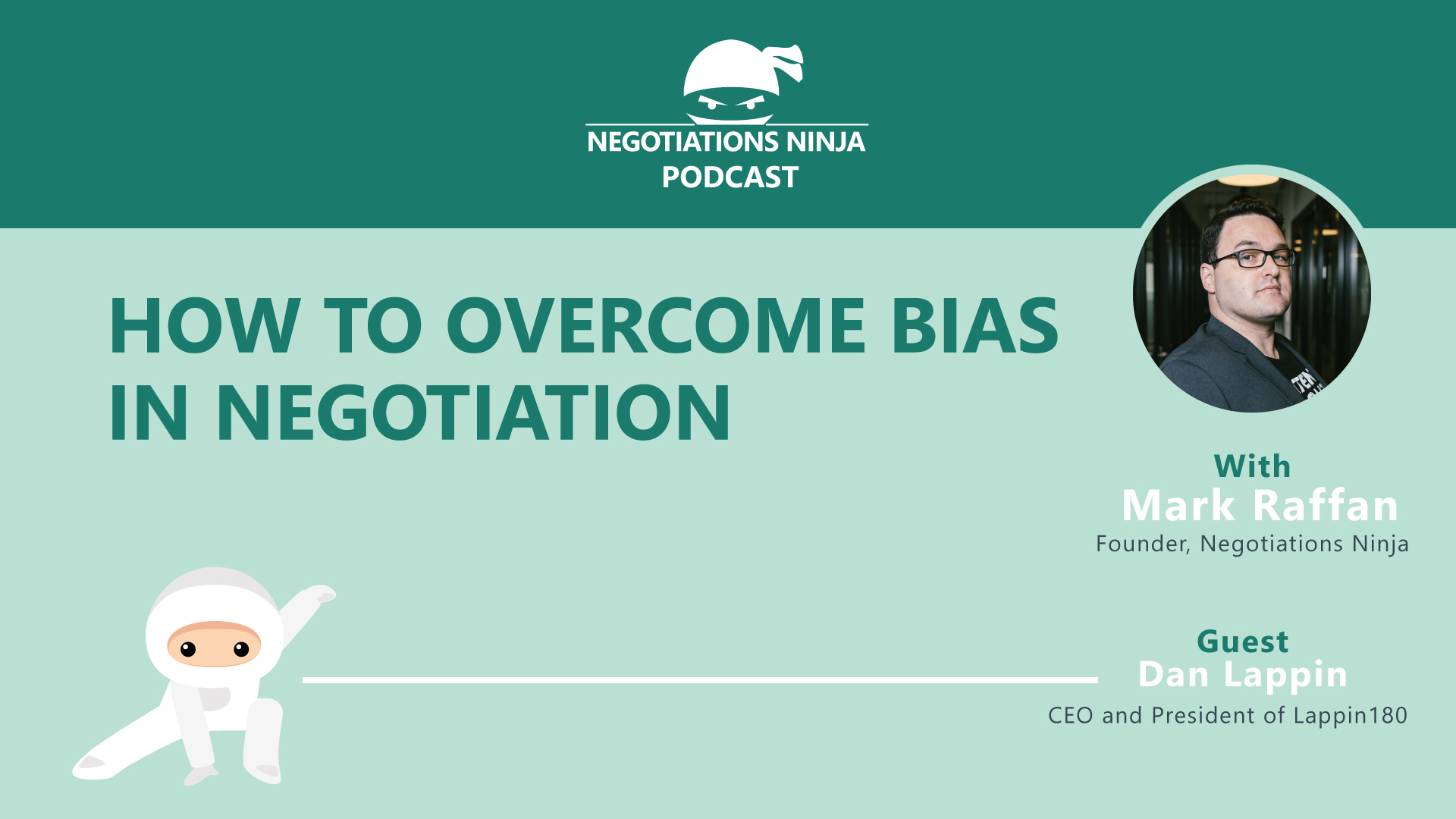How do you overcome bias in a negotiation to get better results? How do you walk into a conversation without an end in mind that influences the outcome? We all have an inherent bias that influences every question we ask and how we interact with others. In this episode of Negotiations Ninja, Dan Lappin—the CEO of Lappin 180—shares some insight from a sales perspective. Listen to hear his thoughts on how to overcome bias in negotiation.
Outline of This Episode
- [1:35] Dan Lappin shares his background
- [3:18] The way we sell isn’t the way people interact
- [5:43] How to remove your attachment to the outcomes
- [10:12] The most common biases to overcome
- [15:40] Change the intent behind your questions
- [19:00] Three mindsets you need to align with
- [20:53] Dan’s biggest piece of advice about negotiation
- [23:01] How to connect with Dan Lappin
Why is bias inherent in negotiation?
Dan points out that sales professionals have biases that they bring into every meeting: “They might want to get another meeting or some kind of commitment. They may want to win the deal. They might want to be able to share their story or share their expertise. But the sales professional wants something—and it’s a bias.”
The prospect typically has to overcome bias as well. Perhaps they feel a loyalty to a current vendor or they’re attached to a strategy or program they have in place—because they’ve worked hard to bring it to fruition. They have a natural sense of pride in what they’ve put in. The bottom line is that negotiation is two human beings going into a conversation with an innate bias.
Why It’s time to STOP selling
Dan Lappin has one goal in mind: to teach sales professionals to STOP selling. Why? Because the behaviors and actions that are conducive to selling aren’t aligned with the buyer making a change. So he teaches a sales process that helps sales professionals remove their bias. The more objective you are the more objective the other person will be.
It starts by removing your attachment to outcomes. You need to overcome and not give in to the scarcity mindset. Never enter a conversation with those thoughts in your head. Everyone wants to make the sale, prove their expertise, and find the prospect’s pain points.
But the prospect has to make the change. They’re the one who has to go through the uncertainty and debate the risk of doing something different. As human beings, we tend to overestimate what we currently have, and underestimate what we could gain by doing something different. If you push a sale, they will become defensive.
The danger of attachment to outcomes
Why is an emotional attachment to outcomes so dangerous? Dan points out that if you get attached to a certain outcome, you have now set the outcome of accomplishing A, B, and C. So when you enter the conversation, you only listen for things that lend to accomplishing A, B, and C. You will only ask questions that help accomplish those things.
You are handcuffing yourself.
Being attached to an outcome doesn’t allow you to listen openly and fluidly. You begin to limit your questions and guide the conversation in the direction you think it should go. Dan emphasizes “If you limit your learning, what you’re really doing is you’re limiting your ability to help this other person think through change. Or you’re limiting the ability to have a fair, equitable, and strong negotiation.”
The illusion of control
People have a wired illusion of control and believe that they can control the outcome of events without any causal links. We can drive the negotiation or sale forward but all we are doing is improving the probability of success—not the guarantee of an outcome. The more you build your skill set, you build the ability to ask great questions and remove yourself from the illusion of control bias that you have. The inherent need to try and control outcomes hurts more than it helps.
The worst thing that you can do walking into a client conversation? Want and need something from them. Human beings pick up on that. When it happens, our trust goes down, and we become defensive and careful.
So what biases are the most common in a negotiation? How do you ask the right questions? What is Dan’s biggest piece of negotiation advice? Listen to the whole episode to find out!
Resources & People Mentioned
Connect with Dan Lappin
Connect With Mark
- Follow Negotiations Ninja on Twitter: @NegotiationPod
- Connect with Mark on LinkedIn
- Follow Negotiations Ninja on LinkedIn
- Connect on Instagram: @NegotiationPod




